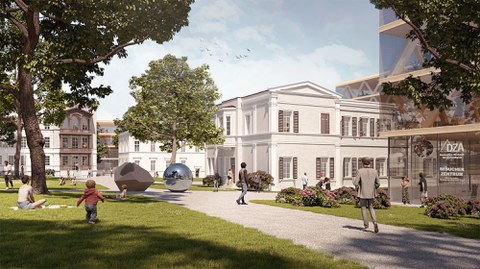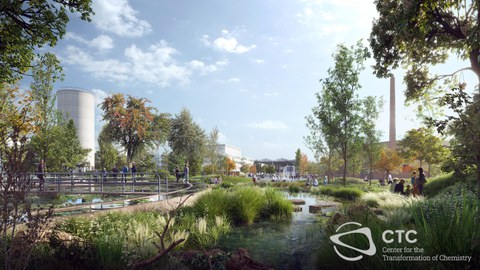29.09.2022
Hightech statt Kohle: TU Dresden an zwei Großforschungszentren beteiligt

Visualisierung des künftigen DZA-Campus.
Zuschlag für Deutsches Zentrum für Astrophysik (DZA) und Center for the Transformation of Chemistry (CTC). TUD baut dabei auch Expertise zu Interdisciplinary Digital Sciences aus.
In zwei neuen Großforschungszentren werden auch Wissenschaftlerinnen und Wissenschaftler der TU Dresden an großen Zukunftsthemen forschen und den Strukturwandel in der sächsischen Lausitz und dem mitteldeutschen Kohlerevier voranbringen. In der Lausitz wird das Deutsche Zentrum für Astrophysik (DZA) entstehen, im mitteldeutschen Revier das Center for the Transformation of Chemistry (CTC). Die Entscheidung im Wettbewerb „Wissen schafft Perspektiven für die Region!“ teilte das Bundesministerium für Bildung und Forschung (BMBF) am 29. September 2022 in Berlin mit.
Mit dem Deutschen Zentrum für Astrophysik (DZA) entsteht in Sachsen ein nationales Forschungszentrum mit internationaler Strahlkraft, das von Bund und Land mit bis zu 170 Mio. Euro jährlich gefördert wird. „Die Entscheidung zum Aufbau dieses Zentrums ist wegweisend, ein Meilenstein für die Wissenschaft, für den Freistaat Sachsen und für die Menschen in der Lausitz“, sagt die Rektorin der TU Dresden, Professorin Ursula M. Staudinger. „Die TU Dresden bringt hier ihre herausragende Expertise in den Bereichen Data Analytics, Künstliche Intelligenz, High Performance Computing und Green Electronics ein und übernimmt zugleich weitere Verantwortung im Strukturwandel in der Region.“
Astrophysik ist eine Hightech-Wissenschaft mit großer Innovationskraft. Heutige Teleskope sind riesige Anlagen, auf der ganzen Welt verteilt, an denen internationale Kollaborationen arbeiten. Für sie sind genaueste Messtechniken notwendig. Die Daten, die künftig jeden Tag aus aller Welt in der Lausitz zusammenlaufen, werden die gesamte Menge der aktuell täglich weltweit im Internet ausgetauschten Daten übersteigen. Daraus ergeben sich zum einen große Herausforderungen an Präzisionsmesstechnik, sei es im Bereich der Optik oder dem Bereich der Sensorik. Zum anderen führen die Anforderungen für Datenspeicherung und Computing zu einem idealen Anwendungsfeld für die Weiterentwicklung der Digital Sciences. Beide Felder bergen enormes Potenzial für Wirtschaft und Gesellschaft.
DZA: TUD liefert Expertise für Interdisciplinary Digital Sciences, Optik und Sensorik
Federführender Antragssteller und Gründungsdirektor des DZA ist der wissenschaftliche Direktor der Europäischen Weltraumorganisation ESA, Professor Günther Hasinger. Die TU Dresden übernimmt während der dreijährigen Aufbauphase die Projektträgerschaft. Zudem wird sie maßgeblich verantwortlich sein für die Weiterentwicklung der digitalen und technologischen Instrumente rund um das DZA. So liefert die TUD die Infrastruktur zur Datenspeicherung, die das DZA für seine Forschungsvorhaben benötigt. Mittelfristig soll am DZA in der Lausitz ein eigenes Rechenzentrum entstehen, das die gigantischen Datenmengen ressourcenschonend bewältigt. Auch hier wird die TU Dresden ihre Expertise einbringen und ausbauen, die sie bereits mit international führenden Projekten wie dem Center for Scalable Data Analytics and Artificial Intelligence (ScaDS.AI) und als Standort für das Nationale Hochleistungsrechnen (NHR) gewonnen hat.
Maßgeblich am Antrag mitgewirkt hat Prof. Wolfgang E. Nagel, Direktor des Center for Interdisciplinary Digital Sciences (CIDS): „Die TU Dresden wird dem DZA ein starker und leistungsfähiger Partner sein. Gemeinsam werden wir nicht nur mit intelligenter Datenanalyse neue Wege in die Digitalisierung beschreiten, sondern mit Green Computing und dem Low Seismic Lab neue Technologielösungen entwickeln und damit wichtige wirtschaftliche Impulse setzen, von denen nicht nur die Astronomie, sondern auch die Gesellschaft profitieren wird.“
Die TU Dresden wird mit drei neuen Professuren die Lehre in der Astrophysik ausbauen. Für die Interdisciplinbary Digital Sciences sind zwei weitere Professuren vorgesehen, die wichtige Forschungsfelder für die Filterung und Speicherung von Daten und das Green Computing voranbringen werden, um mit der Entwicklung energieeffizienter Speichermethoden und Bauelemente die energieintensive IT klimaschonender zu gestalten. Die enormen und immer komplexeren Datenmengen erfordern zudem neue intelligente Analysemethoden und -technologien, die es ermöglichen, das Wissen aus diesen großen Datenmengen zu extrahieren und die dabei entwickelten Analysemethoden in allen Lebensbereichen zu nutzen.
Für die deutsche Wissenschaft wird das DZA den Zugang zu zukünftigen internationalen Großprojekten gewährleisten und auch der Industrie Möglichkeiten eröffnen, sich an Ausschreibungen zu beteiligen. Mit einem Zentrum für Innovation und Transfer (ZIT) geht das DZA dabei neue Wege der Zusammenarbeit von Forschung und Wirtschaft. Durch internationale Sichtbarkeit und Vernetzung wird es Fachkräfte anziehen und Perspektiven für junge Menschen in der Region schaffen. Mehr als 50 – zumeist kleine und mittelständische – Firmen haben die Bewerbung des DZA unterstützt.
CTC: TUD-Forschung für eine nachhaltige Chemie

So könnte das CTC im Mitteldeutschen Revier einmal aussehen.
In einem transdisziplinären Ansatz und mit Kooperation von Wissenschaft, Wirtschaft und Gesellschaft will das Center for the Transformation of Chemistry (CTC) die deutsche Chemieindustrie zu einer Kreislaufwirtschaft transformieren. Initiator und Organisator des CTC ist der Chemiker Prof. Peter H. Seeberger. Auch an diesem für eine Förderung ausgewählten Großforschungszentrum im mitteldeutschen Revier ist die TU Dresden mit wissenschaftlicher Expertise beteiligt.
Prof. Jan J. Weigand, Professor für Anorganische Molekülchemie an der TU Dresden, war als Mitantragsteller maßgeblich an der Entwicklung des CTC beteiligt und wird seine Forschungsexpertise im GFZ einbringen. Im Mittelpunkt steht dabei die Entwicklung innovativer Synthese- und Recyclingkonzepte im Bereich der Anorganischen Molekül- und Materialchemie. Neben neuartigen elektrochemischen Verfahren liegt hier ein besonderer Fokus auf der Wiedergewinnung kritischer Ressourcen wie z.B. Phosphor, Seltene Erden oder Lithium, etwa durch Extraktion aus Abfällen und Reststoffen (Batteriematerial, FCC-Katalysatoren) sowie (katalytische) Methoden zur Synthese von Basischemikalien.
Der Entwicklung einer moderneren und nachhaltigeren Phosphorchemie wird eine besondere Rolle zukommen. Phosphor ist einer der wesentlichen Bausteine allen biologischen Lebens und funktionsgebender Bestandteil vieler Produkte, z.B. in Arzneimitteln, Lebensmitteln oder Düngemitteln. Prof. Weigand und seinem Team war es erst kürzlich gelungen, ein nachhaltigeres Verfahren zur Umwandlung von weißem Phosphor in eine Vielzahl von wichtigen phosphorhaltigen Plattformchemikalien zu entwickeln. Ebenso wird die TU Dresden ihre Kompetenz im Bereich der Katalyse und Biokatalyse, Lebensmittelchemie, Kreislaufwirtschaft, Prozessleittechnik, Lieferketten und der Interdisciplinary Digital Sciences in die Entwicklung des CTC einbringen.
Weitere Informationen zu den ausgewählten GFZ:
Zum DZA: https://deutscheszentrumastrophysik.de
Zum CTC: https://ctc-concept.com
Informationen des BMBF zum Wettbewerb „Wissen schafft Perspektiven für die Region!“
https://www.bmbf.de/bmbf/de/forschung/das-wissenschaftssystem/wissen-schafft-perspektiven-fuer-die-region_/wissen-schafft-perspektiven-fuer-die-region_.html
Ansprechpartner an der TU Dresden:
Deutsches Zentrum für Astrophysik (DZA)
Prof. Wolfgang E. Nagel
Direktor des Center for Interdisciplinary Digital Sciences (CIDS)
Tel.: +49 351 463-35450
Center for the Transformation of Chemistry (CTC)
Prof. Jan J. Weigand
Professur für Anorganische Molekülchemie
Tel.: +49 351 463-42800
